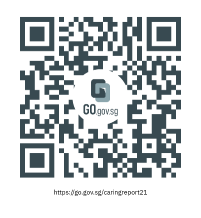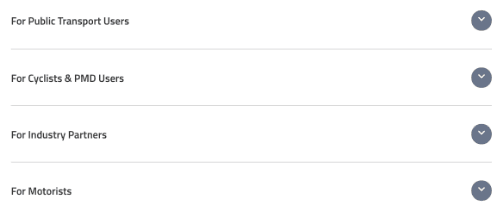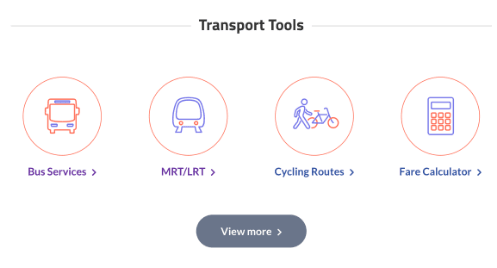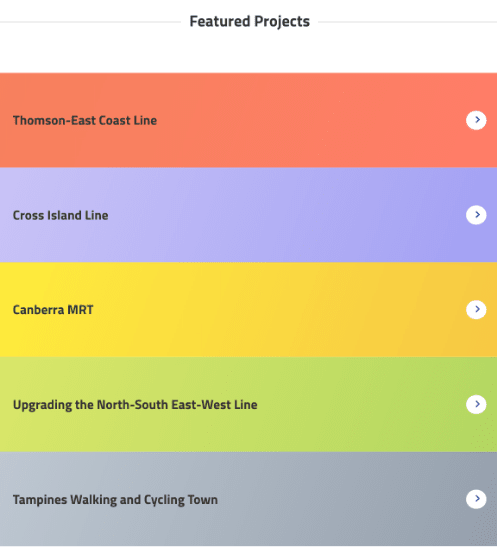Appreciation, education, and empathy – these are among some of the areas of improvement to help commuters better support and care for each other, in particular those with varying needs on public transport.
2
Some of these findings are detailed in a report titled “Our Caring Commuter Journey”, submitted to the Ministry for Transport by the Caring SG Commuters Committee. Formed in 2020, the Committee is tasked to facilitate and pull together multi-agency efforts in the ideation, implementation, and publicity of co-creation initiatives to grow and sustain the efforts to Caring SG Commuters Movement
[1], as well as formulate strategies to foster a caring commuting culture on Singapore’s public transport.
3 The report was presented to Minister for Transport and Minister-in-charge of Trade Relations Mr S Iswaran today (27 Nov) at the launch of Caring Commuter Week 2021, where President Halimah Yacob was the Guest-of-Honour. The report encapsulated insights from the Committee’s engagements with more than 2,000 commuters between April to November last year, across multiple platforms including surveys, online and face-to-face focus group discussions. Those engaged include commuters across various profiles from youths, adults to seniors, the visually impaired as well as caregivers of seniors and the visually impaired. The event was also attended by Senior Parliamentary Secretary, Ministry of Transport, Mr Baey Yam Keng.
4
The inaugural Caring Commuter Week 2021 aims to generate greater awareness and encourage the involvement of the whole community to conduct and spread caring behaviour, and inspire more to sign up as Caring Commuter Champions
[2].
Key Findings
5 Some key findings from the report include:
• A resounding message from the engagements is that caring goes both ways and both the person helping, as well as the one being helped, should show care and appreciation. Enhancing and deepening this level of care would require awareness and accommodation of the different needs among different groups, such as withholding judgment and not reacting negatively when a commuter (e.g. a senior with dementia) behaves differently. Commuters had indicated that it would be encouraging to receive a simple nod of appreciation for the caring acts being done or when help is offered. They added that politely declining a commuter’s offer of help will not discourage the commuter from continuing to offer help to someone else.
• Youths are often viewed by the public in general as givers of care. While youths are supportive of fostering a caring commuter culture, they shared that they too have challenges and concerns which may hold them back from offering help. However, some youths shared that despite their constraints, they do perform some indirect acts of care, such as by quietly vacating their seats for vulnerable commuters or pressing the button for the bus to stop if they see a commuter running for the bus.
• Some commuters, in particular seniors or caregivers of seniors with dementia, shared that they hoped commuters could show them more empathy, even if they did not show an overt need for assistance.
• Some visually impaired commuters shared that they prefer commuting independently and may not always require help. However, they appreciate it when commuters look out for them and give them time and space to navigate, and hope commuters do not feel disheartened when the visually impaired commuter declines the offer of help.
Fostering a Caring Commuting Culture
6 Besides tapping on existing initiatives, the Committee will continue to find ways to foster a caring commuting culture through co-creation and collaboration with different partners. For a start, commuters can contribute through four behaviours while travelling on public transport.
• Give Time – Be patient and give way to commuters such as those using mobility aids;
• Give Care – Look out for commuters who may need help;
• Give a Hand – Readily offer help to commuters who may need it; and
• Give Thanks – Thank commuters who have offered help.
Caring Commuter Week 2021
7 The first ever Caring Commuter Week (27 Nov – 5 Dec) will see a host of activities organised to inspire acts of care:
• The Transport Gold and Caring Commuter Awards 2021 on Wednesday, 1 Dec 2021, will recognise service staff in the transport industry, who had displayed exemplary service and gracious behaviour, as well as public transport commuters, who have demonstrated acts of care to others in need. Look out for the news release for more information on the award ceremony and the winners.
• Opening of three new Heart Zones at Bukit Batok Bus Interchange, Yishun Integrated Transport Hub and Woodlands Integrated Transport Hub. Seven artists from the Down Syndrome Association (Singapore) who designed the Heart Zone artwork at Bukit Batok Bus Interchange will join Senior Parliamentary Secretary Mr Baey Yam Keng at the bus interchange on Thursday, 2 Dec for the launch event. These new Heart Zones are part of the progressive roll-out under the Land Transport Master Plan 2040 at MRT stations and bus interchanges to provide a platform for commuters to lend a helping hand to fellow commuters who may need assistance during their public transport commute.
• In addition, there will be a Public Bus Inclusivity Course (PBIC) session with students from NUS Enablers – a student group passionate to help those with special needs, on 30 Nov (Tue) at the Jurong East Bus Interchange. The PBIC is a programme where participants learn how to help their fellow commuters on public buses. It will equip them with an awareness on the needs of vulnerable commuters, basic knowledge in assisting such commuters, and soft skills such as offering assistance to others. PBIC is designed to give participants hands-on training in the necessary skills and sensitivities to assist fellow commuters and foster a more caring and inclusive commuting culture.
• Throughout the week, commuters transiting at the different transport nodes will be able to find out more on how they can support the Caring Commuter Movement at these exhibitions by the Public Transport Operators and their partners:
Where
|
What |
Who |
Jurong East Bus Interchange
|
Inclusivity initiatives and information on commuting challenges faced by persons with various disabilities and how commuters could assist them.
|
Tower Transit Singapore and SPD
|
Pasir Ris Bus Interchange
|
Autism and supporting the travel experience of persons with autism
|
Go Ahead Singapore and Rainbow Centre
|
Toa Payoh Integrated Transport Hub
|
Commuting challenges of passengers-in-wheelchairs and the visually handicapped and how commuters can assist them
|
SBS Transit, Handicaps Welfare Association, SPD, Singapore Association of the Visually Handicapped, Guide Dogs Singapore and Muscular Dystrophy Association Singapore
|
Woodlands Integrated Transport Hub
|
Dementia and how to identify and help persons with dementia during a commute
|
SMRT (Buses and Trains) and Agency for Integrated Care
|
At various MRT stations – see Annex B
|
Sign up to be Caring Commuter Champions, and take part in online games and quizzes.
|
Caring SG Commuters Committee
|
8 To find out more about Caring Commuter initiatives and how to take part, the public can visit the Caring SG Commuters Portal. For more details on committee’s past and ongoing initiatives, please refer to the
Annex C. To read the full report, please scan the QR code below.

















